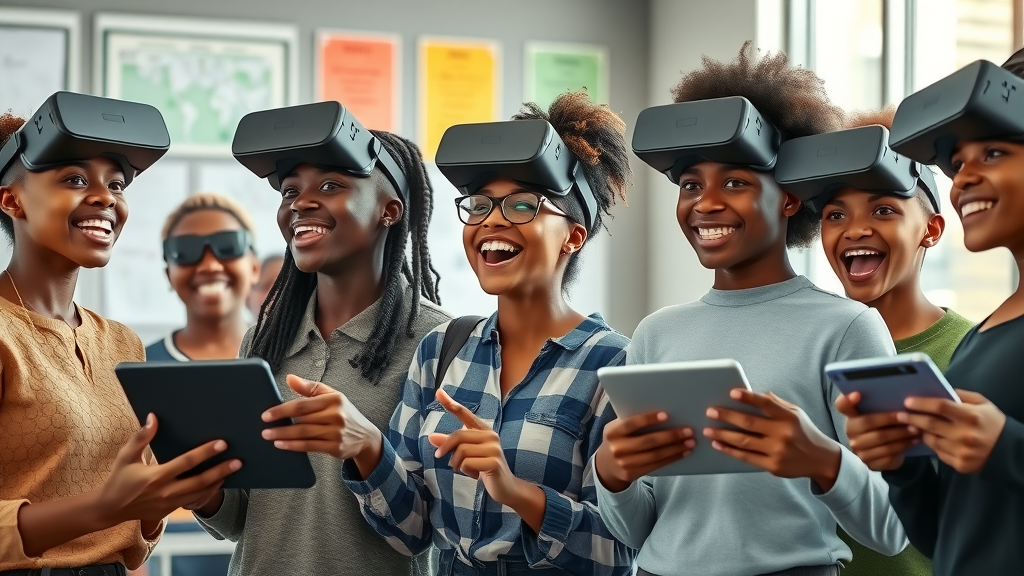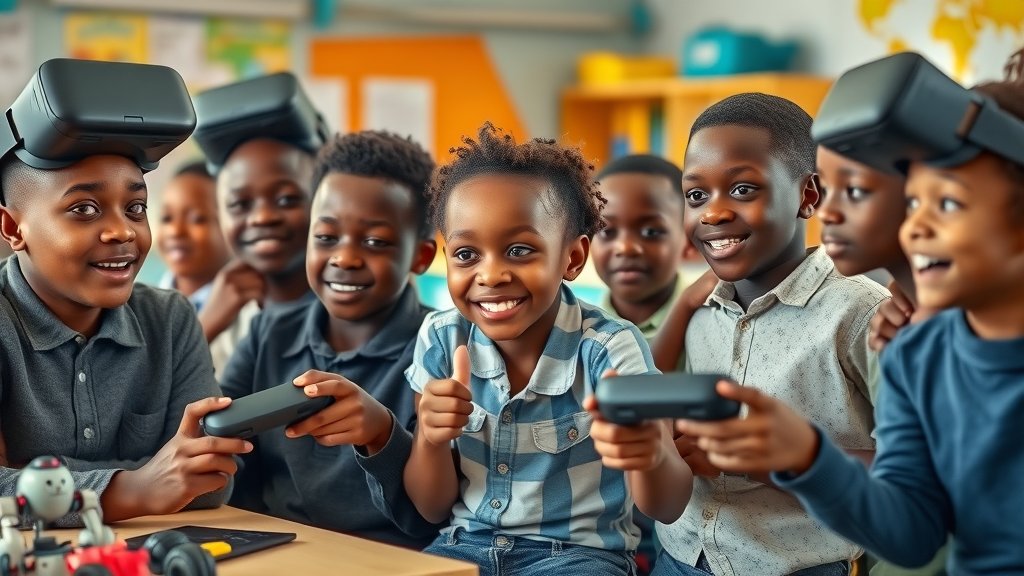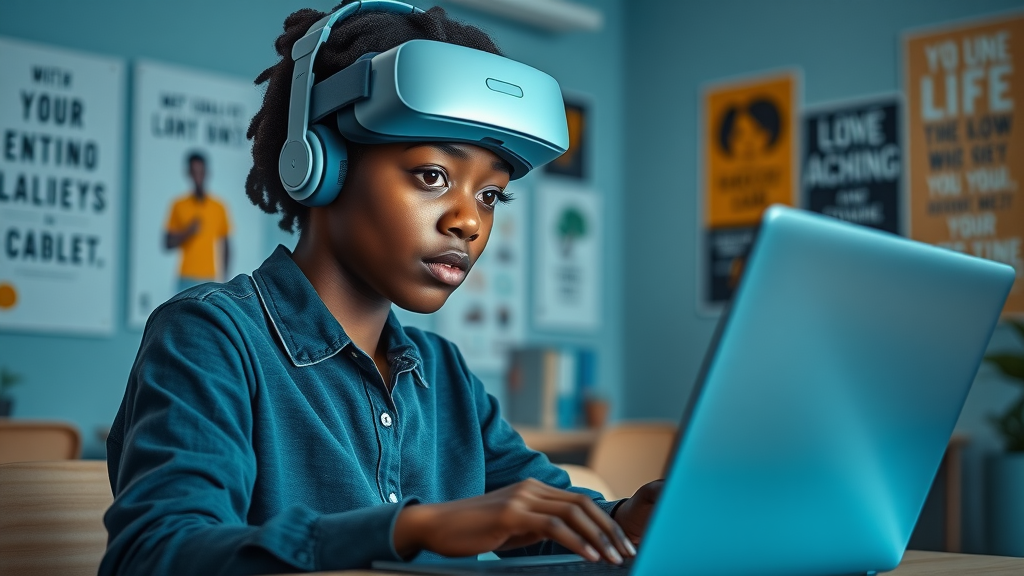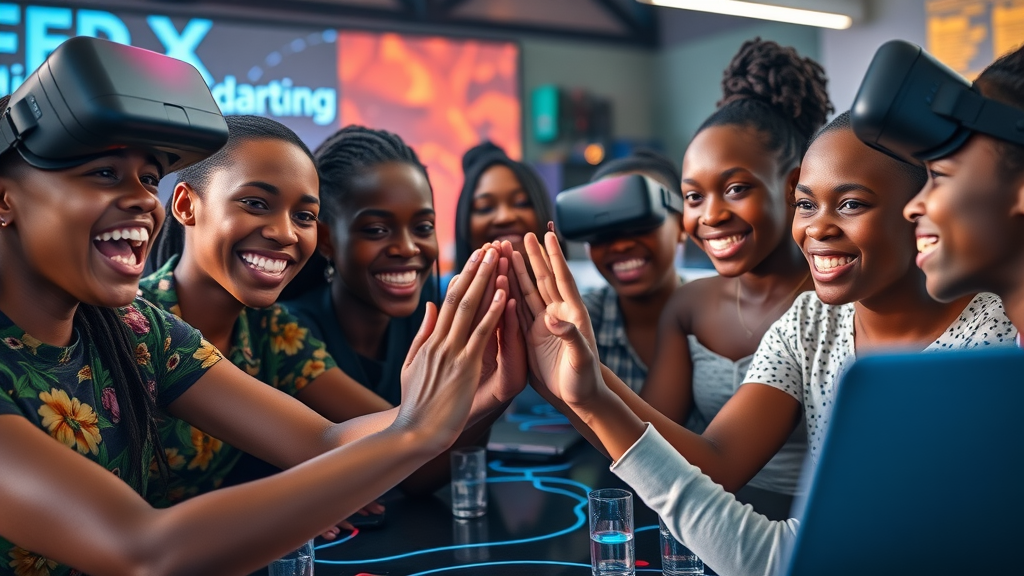Did you know? By 2030, digital jobs could create up to 230 million opportunities across Africa. The next generation will code, not copy: VR sparks digital skills in Africa—a young learner, inspired by a VR robotics simulation, builds a basic app with AI’s help—no coding experience needed. This is the revolution: VR doesn’t just teach, it empowers youth to shape their own futures and Africa’s digital destiny.
Setting the Stage: Africa’s Digital Opportunity and the Next Generation
"By 2030, digital jobs could create up to 230 million opportunities in Africa."
Africa stands at a critical crossroads of technological innovation and youthful potential. With the world's youngest population, the continent is uniquely positioned to seize unprecedented digital opportunities. The question is no longer if, but how Africa’s youth will leap from passive users to digital creators. The surge of virtual reality (VR), AI, and robotics tools—like the Coglabs program now piloted in Uganda—signals a monumental shift.
Rather than replicating Western models with copy-paste learning, forward-thinking African educators and policymakers—bolstered by international google partner innovation and UNESCO Coglabs—are forging a new path. Today, young learners aren’t downloading apps; they’re creating them, using AI-driven tools that help them recognize objects and run commands in real time. From building basic machine learning models to piloting a VR robotics simulation, Africa’s next generation is primed to code, not copy. This is more than a skills boom: it’s about Africa reclaiming its digital narrative, with children empowered to architect futures for themselves, their communities, and the continent at large.

The Next Generation Will Code, Not Copy: Why Africa Must Lead the Digital Revolution
For too long, Africa’s educational technology outcomes were shaped by external entities and second-hand solutions. But now, a new paradigm emerges: the next generation will code, not copy, and the catalyst is immersive digital learning ecosystems. With tools like the Coglabs app showing how programs are created to recognize objects and run commands by students themselves, we witness the dawn of ingenuity that’s homegrown.
The call to action is urgent—prioritise human-centered frameworks such as the Sovereign’s Code to ensure Africa leads, not lags, in the age of AI. The digital revolution in education doesn’t only foster coding and robotics skills; it empowers students to solve local problems, foster entrepreneurship, and spark grassroots innovation. By embracing robotics and machine learning, African youth are not merely joining the global tech workforce—they’re shaping it in their image, moving the continent from digital dependency to digital sovereignty.
From Copying to Coding: A Young Learner’s Journey through VR in Uganda
Consider a classroom in Uganda where VR isn’t just a science fiction fantasy—it’s a daily reality. Here, children don VR headsets in a safe, collaborative space, engaging with educational robots and machine learning modules. The shift from rote memorisation to active creation is profound: using visual coding platforms, they drag and drop code blocks to build simple AI models. In one Coglabs pilot, a young girl develops an app showing how programs are created to recognize objects and run commands—no previous coding knowledge required. Instead of repeating what’s been done somewhere else, she becomes a pioneer, harnessing robotics and machine learning to solve challenges unique to her community.
Such examples are not isolated. Across Africa, from Uganda to South Africa and Kenya, teachers and students are combining VR, robotics, and machine learning to design solutions for local needs. UNESCO and the Ministry of Education have collaborated on training resources, demonstrating a commitment to sustainable, scalable impact. The real lesson? When empowered with the right tools and frameworks, Africa’s youth leap from passive tech consumers to inspired creators.
What You'll Learn
- The impact of VR and robotics on digital skills in Uganda and across Africa
- How virtual reality nurtures coding and entrepreneurial thinking
- Why youth empowerment matters for Africa’s digital economy
- Ethical considerations and the ‘Sovereign’s Code’ in local tech innovation
VR Sparks Digital Skills: A Look Across Africa
VR in Education: Transforming Classrooms from Uganda to Kenya
The adoption of VR across African classrooms has moved from pilot projects to scalable models, proving its worth across diverse contexts—from urban hubs in Uganda to remote communities in Kenya. In practice, students use VR to simulate real-world scenarios, such as interactive coding with robotics and hands-on machine learning experiences. The Coglabs program, a collaborative google partner innovation with UNESCO, has demonstrated remarkable success. The app showing how programs are created to recognize objects and run commands is not only intuitive but also accessible, breaking barriers for students with no prior coding experience.
Beyond entertainment, these immersive experiences drive tangible learning outcomes. Children navigate digital environments where they direct educational robots, program objects and run commands using visual coding—gaining confidence that transcends the classroom. Teachers and students collaboratively design, debug, and deploy digital projects using the Coglabs app, ensuring that education is not just a one-way broadcast but a participatory, creator-driven journey.

Case Study: A Young Learner Builds an App with AI—No Coding Experience Needed
In a bustling Ugandan primary school, a student participates in a ‘VR robotics simulation day’ through the Coglabs app, collaborating with teachers and peers. She drags and drops code blocks, constructing logic that instructs an educational robot to recognize objects and run commands. The transformation is remarkable: within a single afternoon, a child with no prior knowledge of programming or AI has built a basic application—a genuine app showing how models are created to recognize and act on new information.
This arc—from tech user to digital creator—captures the ethos of Africa’s digital awakening. The Coglabs pilot exemplifies how machine learning and robotics are made accessible, lowering barriers and catalysing creative problem-solving across Africa. More importantly, such stories prove that technology, when localised and democratised, is an equaliser: children from under-resourced schools can now prototype, test, and iterate code in real time, preparing for the digital economy’s demands.
Digital Skills in Africa: Moving From Passive Consumers to Active Creators

The Next Generation Will Code, Not Copy: Shifting Mindsets for Future Work
The most profound shift occurring across Africa is not technological—it’s ideological. The mantra—The next generation will code, not copy—embodies a new mindset, prioritising agency over imitation. With platforms like Coglabs, young Africans are not just learning to run commands; they’re conceptualising, prototyping, and deploying solutions. Teachers and students become co-creators, working together to design programs and models—skills once reserved for elite programmers in Silicon Valley.
In this emerging paradigm, robotics and machine learning aren’t destinations but springboards. Digital skills become the new currency of social mobility and economic innovation. As more teachers and students gain access to visual coding and AI-powered robots, the cycle of passive technology consumption is broken. African youth, buoyed by direct experience, are ready to lead in local entrepreneurship, smart agriculture, fintech, and beyond.
The Demand for Digital Skills in Africa: Economic Growth & Social Change
The economic imperative is clear: by 2030, Africa’s burgeoning youth population will need meaningful employment and purpose-driven work. Data from the Ministry of Education, the World Economic Forum, and partner institutions underscore the demand for digital competence. With desktop computers increasingly replaced by tablets and mobile labs, access to coding, robotics, and machine learning training is growing fast across Africa.
This transformation isn’t just about creating apps showing how programs are created to recognize objects and run commands. It’s about catalysing inclusive, sustainable growth. Sectors from agriculture and health to finance and energy are being reshaped by digital skills. When girls in Uganda or rural students in South Africa code their own solutions, the ripple effects are felt across Africa—through job creation, community empowerment, and technological innovation.
| Sector | 2024 Jobs | 2030 Projected Jobs | Growth (%) |
|---|---|---|---|
| Information & Communication Technology (ICT) | 4,200,000 | 17,500,000 | +316% |
| AgriTech & Smart Farming | 850,000 | 5,200,000 | +512% |
| HealthTech | 600,000 | 2,950,000 | +391% |
| EdTech & Learning Platforms | 330,000 | 1,800,000 | +445% |
| Green Energy & Environmental Monitoring | 190,000 | 1,050,000 | +453% |
Ethical AI and the ‘Sovereign’s Code’: Human-Centered Progress
Why Ethical Frameworks Matter in African Tech Innovation
In the rush toward digital empowerment, Africa stands at another crossroads: how to champion rapid innovation without sacrificing human-centred ethics and sovereignty. The Sovereign’s Code—a principle advocating responsible, equitable, and locally guided technology deployment—underscores the necessity of balancing progress with protection. As machine learning models become ubiquitous across Africa, ethical AI becomes not just an academic concern but a societal imperative.
Numerous African ministries of education, together with UNESCO and Coglabs program leaders, have prioritised responsible design. Whenever apps showing how programs are created to recognize objects and run commands appear in the classroom, students are taught the importance of privacy, agency, and cultural sensitivity. The aim: ensure technology remains a liberator, not an oppressor, by keeping human values at the core of every robotics and machine learning curriculum.
"Learning is not just the transfer of knowledge but the birth of possibility." – The Digital Philosopher
Championing Local Talent: Policies that Support the Next Generation
Policy innovation is vital if Africa’s youth are to become creators in the digital economy. Ministries collaborating with international partners (like the google partner innovation with Coglabs) are enacting policies to distribute hardware and software equitably and train teachers in both urban and rural settings. The vision: democratise digital skills so every young learner from Uganda to Nigeria to South Africa can access VR, robotics, and AI without barriers.
Forward-thinking leaders are not just investing in printed parts or desktop computers but building holistic digital skills pipelines from primary school through university and continuing education. This approach amplifies local entrepreneurship, enables rural talent to access opportunities once limited to cities, and safeguards the human-centred mission of Africa’s digital revolution.
Success Stories: VR and Digital Skill-Building Across Africa
- Uganda: Girls in STEM foster digital literacy through VR coding bootcamps
- Nigeria: EdTech startups scaling impact via VR-led learning labs
- South Africa: Rural schools leapfrogging the digital divide with immersive tech

People Also Ask: How Is Africa’s Youth Embracing Digital Skills?
How are virtual reality and robotics helping African youth develop coding skills?
Virtual reality and robotics are revolutionising how African youth learn to code. With interactive platforms like the Coglabs app, students use visual coding to instruct educational robots, allowing them to recognise objects and run commands. These immersive, real-world experiences remove barriers to entry—young learners, regardless of their prior exposure, can design, test, and refine apps. These technologies don’t just teach coding—they foster creative problem-solving and prepare Africa’s next generation to shape, not just consume, the digital future.
What role do local entrepreneurs and policymakers play in scaling these innovations?
Local entrepreneurs and policymakers are critical to the diffusion of digital skills across Africa. Entrepreneurs launch EdTech startups, develop hardware like printed parts for educational robots, and partner with international bodies like the UNESCO Coglabs initiative. Policymakers—especially from ministries of education—facilitate access by supporting training for teachers and allocating digital resources to underserved communities. Together, they ensure digital skills development isn’t limited to a privileged few, but scaled broadly so that students across Africa, including girls and rural learners, can thrive.

Are digital jobs really the future for Africa’s next generation?
All signs point to yes: by 2030, up to 230 million digital jobs could emerge across Africa, with advances in AI, robotics, and machine learning transforming nearly every sector. The next generation will code, not copy, participating directly in the creation of software, apps showing how programs are created to recognize objects, and deploying solutions tailored to Africa’s context. This transition will create new avenues of social mobility, self-determination, and economic growth—but only if access and training are expanded equitably to all youth.
What ethical concerns exist around deploying AI and VR in schools?
Deploying AI and VR in African schools requires careful attention to ethical challenges, including data privacy, equitable access, and cultural appropriateness. The Sovereign’s Code advocates for human-centred design, transparency in machine learning and robotics, and ongoing support from both local and international partners. With robust policies and ethical frameworks, leaders can ensure technology protects and empowers African youth, rather than exposing them to new risks.
How can young people access these technologies in underserved regions?
Access to digital technologies is improving through public-private partnerships, targeted policy reforms, and grants from organisations like UNESCO and Google partner innovation hubs. The spread of affordable printed parts for educational robots, mobile labs, and solar-powered desktop computers means even learners in remote areas can participate. Teacher training, open-source resources, and community bootcamps further bridge the gap, catalysing digital literacy and creative coding across Africa.
Forward-Thinking AI: The So What of Sovereign, Human-Centered Digital Skills
Long-Term Impact: The Next Generation Inspiring Change Across Africa
In every region across Africa, the long-term impacts of equipping youth with VR and AI skills are already visible. These empowered learners drive local economies and solve community challenges, while their innovations set new standards globally. From the bustling tech hubs in Nairobi and Lagos to rural classrooms using printed parts and educational robots, the promise is the same: the next generation, taught to code—not copy—leads Africa’s emergence as a digital powerhouse.

Redefining the Future: Digital Skills as the Foundation for African Greatness
Digital skills aren’t just a means to a job—they’re Africa’s gateway to sovereignty and global relevance. When every child can build an app showing how programs are created to recognize objects and run commands, the continent is no longer following but leading. Talent pipelines built in Uganda, Nigeria, and South Africa today will shape the world’s technology standards of tomorrow. This is how Africa defines greatness—by empowering its next generation to architect the future on their own terms.
Key Takeaways for Tech Leaders and Policymakers
- Invest in digital education infrastructure, particularly VR and low-code platforms.
- Institute ethical frameworks (The ‘Sovereign’s Code’).
- Champion inclusion—ensure girls, marginalised youth, and rural communities aren’t left behind.
- Support youth entrepreneurship and innovation in AI and VR sectors.
FAQs: The Next Generation Will Code, Not Copy
-
What is the ‘Sovereign’s Code’ and why does it matter?
The Sovereign’s Code is an ethical, human-centred framework that guides the responsible deployment of AI and VR technology in Africa. It ensures local control, protects privacy, and upholds cultural values—keeping people, not algorithms, at the heart of digital progress. -
How can VR and AI be safely integrated into African schools?
By following best practices for digital safety, including teacher training, privacy safeguards, and appropriate content vetting, schools can integrate VR and AI to maximise learning while minimising risk. Open-source visual coding platforms like Coglabs make this transition accessible and manageable for educators. -
Where can parents and teachers access training resources?
Parents and teachers can access free and low-cost training resources through UNESCO Coglabs, local ministry of education initiatives, and platforms supported by Google partner innovation. Community bootcamps and online modules are also increasingly available to expand digital literacy.
Conclusion: Why ‘The Next Generation Will Code, Not Copy’ Is Africa’s Pathway to Sovereignty
The next generation will code, not copy. VR, robotics, and ethical AI are lighting the way for Africa’s self-determined digital future—where every child is an empowered creator and sovereign architect of progress.
Invest in the Minds Which Will Build the Future of Africa
- Discover Fanancial Fitness Fortunes Hub News – https://futurepreneurs.fanancialfitnessfortunes.com/hub-news
- Architecting the Next Generation of Genius | Learning is the New Revolution: subscribe to our AI In Africa Digital Media Channel Here: https://aiafricanews.com
Sources
- World Economic Forum – Africa’s digital economy
- UNESCO – Digital transformation of education in Africa
- Africa 2030 Digital Skills Roadmap
- Coglabs Program
- AI In Africa News – Digital Skills in Africa
The article “The Next Generation Will Code, Not Copy: VR Sparks Digital Skills in Uganda, East Africa” highlights the transformative role of virtual reality (VR) in equipping African youth with essential digital skills. This shift is crucial, as projections indicate that by 2030, up to 230 million jobs across Sub-Saharan Africa will require digital competencies. (ifc.org)
To delve deeper into this topic, the International Finance Corporation’s report, “Digital Skills in Sub-Saharan Africa: Spotlight on Ghana,” offers comprehensive insights into the burgeoning demand for digital skills and the associated economic opportunities. Additionally, the World Economic Forum’s article, “Africa needs digital skills across the economy – not just in tech,” emphasizes the necessity of digital literacy across various sectors to drive inclusive growth. (ifc.org)
For those committed to understanding and contributing to Africa’s digital transformation, these resources provide valuable perspectives on the challenges and opportunities ahead.
 Add Row
Add Row  Add
Add 




Write A Comment